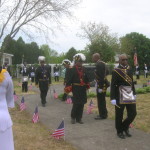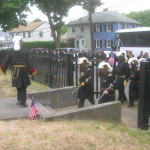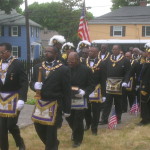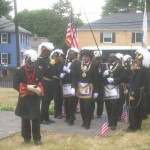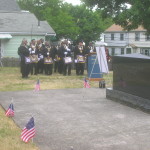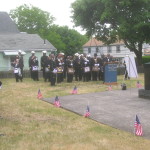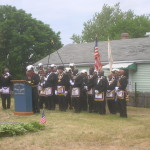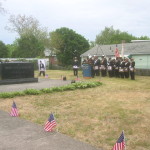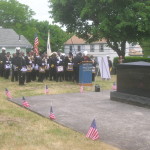Monday, May 29, 2015
Stuart Brorson, President
Arlington Historical Society
Good morning. I am Stuart Brorson, First Vice President of the
Arlington Historical Society. On Behalf of the AHS, I want to extend
a warm welcome to members of the Prince Hall Grand Lodge, and to
everybody who has gathered here today.
Today is Memorial Day – the day we remember and honor the lives of
those members of the armed services who have died while in service to
our country. Therefore, it is fitting that we pause here to remember
and honor the Masons who are buried in this cemetery, and to reflect
on the connections of this modest cemetery to the grand struggles of
our country’s history – One struggle for self-governance and
independence from Britain, another for freedom and equality for people
of African descent.
An important part of America’s revolutionary struggle played out right
here in Arlington, along what is now Massachusetts Avenue. Arlington
Center was the site of the heaviest fighting which took place during
the British Retreat from Concord on April 19, 1775 – the first day of
our American Revolution. Our historical society’s headquarters are
connected to the preserved Jason Russell House – a farmer’s residence
where 12 people lost their lives in battle on that day. More lives
were lost in battle here in in Arlington than in any other town on
that day – the first day of the revolution.
The events of April 19th 1775 electrified Boston and the other
colonies. One can imagine that a man like Prince Hall reacted
enthusiastically to the news. Only a couple of months later, in June
1775, came the Battle of Bunker Hill. Although details are scanty,
Prince Hall is said by some to have been one of the few black men who
fought in the Battle of Bunker Hill. We do know for
certain that through his business as a leather craftsman, Prince Hall
sold five leather drumheads to the Boston Regiment of Artillery in
1777, presumably for use in revolutionary battle. Prince Hall’s life
and work are therefore connected intimately with America’s
revolutionary struggle.
The other struggle associated with Prince Hall is, of course, our
country’s struggle for freedom and equality for people of African
descent. Prince Hall successfully struggled to found the first black
Masonic lodge in America – which of course is why we are all gathered
here. You are the inheritors of his legacy. As you know, Prince Hall
also authored several petitions demanding freedom for slaves, preached
messages about the abolition of slavery while a minister at the AME
church in Cambridge, and was an advocate for education for blacks at a
time when even that was a revolutionary idea.
History has a way of playing out over the course of generations.
Prince Hall founded your Grand Lodge in 1776. The lodge was
successful, and we greet you, its members, here in Arlington today.
This land where we stand was deeded to the Prince Hall Grand Lodge by
its Grand Master, William B. Kendall, in 1864 – during the last year
of another period of struggle, the Civil War. This cemetery was
dedicated in 1868 and records indicate it was active until about 1897
when it fell into disuse. You all know the story of how this cemetery
was forgotten in the years after 1900, and was considered by most to
be a vacant lot for decades until its historical significance
was recognized in the later 1980s. After that, this cemetery was
restored, and in 1990 it was first rededicated. Therefore, this is a
particularly special day for the Prince Hall Mystic Cemetery. Today,
in 2015, we mark the 25th anniversary of the Prince Hall
Cemetery’s rededication – it’s the silver anniversary of that first
1990 rededication.
To close, I want to say that by gathering in this cemetery today, we
stand in the presence of two large themes of American history, in
particular the struggle for freedom by black people, and the struggle
for self-government by all Americans. This cemetery is a special
place.
I thank you for your attention and I hope to greet you again here next
year.


